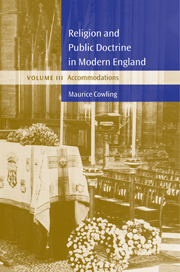Book contents
- Frontmatter
- Contents
- Foreword and acknowledgements
- Introduction
- I The Christian intellect and modern thought in modern England
- 1 The reanimation of Protestantism I
- 2 Christianity and literature I
- 3 The reanimation of Protestantism II
- 4 The enlargement of Christianity
- 5 Christianity and literature II
- 6 Christianity and modern knowledge I
- 7 Whiggism, Liberalism and Christianity I
- 8 Whiggism, Liberalism and Christianity II
- 9 Christianity and modern knowledge II
- 10 Christianity in an unfriendly world I
- 11 Christianity in an unfriendly world II
- 12 Christianity in an unfriendly world III
- 13 Christianity in an unfriendly world IV
- 14 Christianity in an unfriendly world V
- II The post-Christian consensus
- III Conclusion: religion and public doctrine in modern England
- Notes
- Index of proper names
13 - Christianity in an unfriendly world IV
Published online by Cambridge University Press: 23 December 2009
- Frontmatter
- Contents
- Foreword and acknowledgements
- Introduction
- I The Christian intellect and modern thought in modern England
- 1 The reanimation of Protestantism I
- 2 Christianity and literature I
- 3 The reanimation of Protestantism II
- 4 The enlargement of Christianity
- 5 Christianity and literature II
- 6 Christianity and modern knowledge I
- 7 Whiggism, Liberalism and Christianity I
- 8 Whiggism, Liberalism and Christianity II
- 9 Christianity and modern knowledge II
- 10 Christianity in an unfriendly world I
- 11 Christianity in an unfriendly world II
- 12 Christianity in an unfriendly world III
- 13 Christianity in an unfriendly world IV
- 14 Christianity in an unfriendly world V
- II The post-Christian consensus
- III Conclusion: religion and public doctrine in modern England
- Notes
- Index of proper names
Summary
It is exceedingly difficult nowadays to inculcate into people any conception of genuine religion … In the psyche of educated people … there is only a big, black hole.
(C. G. Jung to Pastor J. Schattauer, 20 February 1933, in A. Adler, ed., C. G. Jung: Letters, 1973 I, p. 118)In England it never seems to occur to me that I am in a Christian country.
(R. C. Zaehner, Address Delivered on Founder's Day 1969 at St Stephen's College, Delhi, reprinted in Evolution in Religion 1971, p. 115)It is not possible for the controlling laws of the spiritual substratum which in so far as it is known to us in consciousness is essentially non-metrical, to be analogous to the differential and other mathematical equations of physics which are meaningless unless they are fed with metrical quantities. So that the crudest anthropomorphic image of a spiritual deity can scarcely be so wide of the truth as one conceived in terms of metrical equations.
(A. Eddington, The Nature of the Physical World, 1928, 1929 edn, pp. 281–2)It was obvious to most of the thinkers of the last three chapters that Christianity was ceasing to be dominant, was unlikely to regain its predominance and would have an intellectually uncertain future. To some of the Christian thinkers to be discussed in this chapter, it seemed that a ‘rational’ rescue-operation might have to defer to a ‘mystical’ rescue-operation.
As a supplement to dogma, and a way of avoiding dogma, mysticism in England in the last century and a half has been both aspiration and bolt-hole.
- Type
- Chapter
- Information
- Religion and Public Doctrine in Modern England , pp. 337 - 370Publisher: Cambridge University PressPrint publication year: 2001



